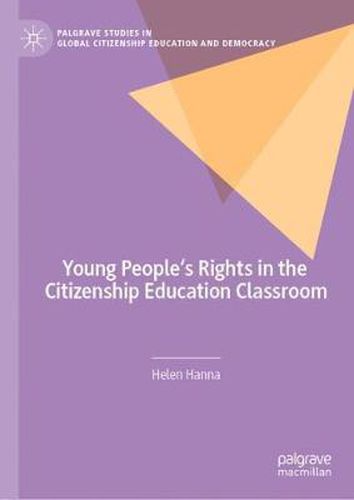Readings Newsletter
Become a Readings Member to make your shopping experience even easier.
Sign in or sign up for free!
You’re not far away from qualifying for FREE standard shipping within Australia
You’ve qualified for FREE standard shipping within Australia
The cart is loading…






This title is printed to order. This book may have been self-published. If so, we cannot guarantee the quality of the content. In the main most books will have gone through the editing process however some may not. We therefore suggest that you be aware of this before ordering this book. If in doubt check either the author or publisher’s details as we are unable to accept any returns unless they are faulty. Please contact us if you have any questions.
This book explores the rights held by young people in the citizenship education classroom in the divided societies of Northern Ireland and Israel. Against the backdrop of a long history of protracted conflict and division, the author analyses how international rights obligations are reflected in the contested citizenship education curriculum in secondary schools. Drawing upon extensive qualitative data as well as policy and curriculum documents, the author reveals that understandings of education rights can be oriented around three themes - minority group representation in the curriculum, dealing with difference through pedagogy, and preparing young people for life in a (divided) society. This can be mapped onto the 42-A rights framework where education should be ‘acceptable’ and ‘adaptable’. However, the variety of interpretations held by participants raises questions regarding the ‘universality’ of international frameworks for education rights, and the workability of such frameworks in the national and divided contexts. While the contexts of Northern Ireland and Israel have much in common, they are rarely compared: this book will show that their comparison is as relevant as ever, as issues of identity continue to affect everyday school life. This book will be of interest to citizenship and history education scholars, as well as those who are concerned with the application of international human rights law.
$9.00 standard shipping within Australia
FREE standard shipping within Australia for orders over $100.00
Express & International shipping calculated at checkout
This title is printed to order. This book may have been self-published. If so, we cannot guarantee the quality of the content. In the main most books will have gone through the editing process however some may not. We therefore suggest that you be aware of this before ordering this book. If in doubt check either the author or publisher’s details as we are unable to accept any returns unless they are faulty. Please contact us if you have any questions.
This book explores the rights held by young people in the citizenship education classroom in the divided societies of Northern Ireland and Israel. Against the backdrop of a long history of protracted conflict and division, the author analyses how international rights obligations are reflected in the contested citizenship education curriculum in secondary schools. Drawing upon extensive qualitative data as well as policy and curriculum documents, the author reveals that understandings of education rights can be oriented around three themes - minority group representation in the curriculum, dealing with difference through pedagogy, and preparing young people for life in a (divided) society. This can be mapped onto the 42-A rights framework where education should be ‘acceptable’ and ‘adaptable’. However, the variety of interpretations held by participants raises questions regarding the ‘universality’ of international frameworks for education rights, and the workability of such frameworks in the national and divided contexts. While the contexts of Northern Ireland and Israel have much in common, they are rarely compared: this book will show that their comparison is as relevant as ever, as issues of identity continue to affect everyday school life. This book will be of interest to citizenship and history education scholars, as well as those who are concerned with the application of international human rights law.